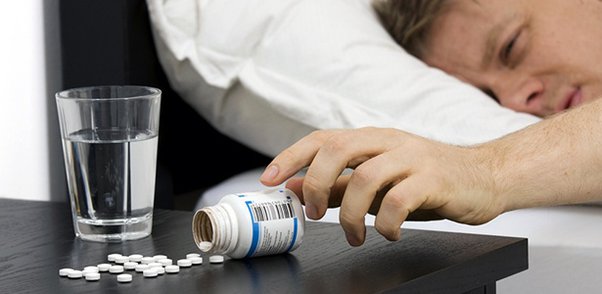Why Should You Be Cautious With Over-The-Counter Sleep Aids?

Over-the-counter sleep aids are widely available and often perceived as a quick fix for sleep problems. However, it is important to approach these medications with caution.
This article explores the potential risks and side effects associated with over-the-counter sleep aids, the lack of long-term solutions they provide, and the importance of considering natural alternatives for better sleep. It emphasizes the significance of consulting with a healthcare professional before taking any sleep aids and highlights the importance of sleep hygiene in managing sleep issues.
Additionally, this article stresses the need to understand the underlying causes of sleep problems and the importance of making informed decisions for one’s sleep health. By providing a comprehensive overview of the potential drawbacks of over-the-counter sleep aids, this article aims to promote a cautious approach to their use and encourage individuals to explore alternative strategies for improving their sleep quality.
Key Takeaways
- Over-the-counter sleep aids provide temporary relief but do not address the underlying causes of sleep problems.
- These sleep aids can have potential risks and side effects, including drowsiness, dizziness, and dry mouth.
- Over-the-counter sleep aids can lead to dependency or tolerance if used for a long time.
- It is crucial to consult a healthcare professional before using these sleep aids.
Understanding Over-the-Counter Sleep Aids
Understanding the potential risks associated with over-the-counter sleep aids is crucial in order to make informed decisions and protect one’s well-being.
Over-the-counter sleep aids are medications that can be purchased without a prescription to help individuals with sleep difficulties. These medications typically contain antihistamines, which have sedating effects. While they may seem like a convenient solution for occasional sleeplessness, it is important to exercise caution.
One reason for caution is the potential for side effects. Common side effects include drowsiness, dizziness, and dry mouth. Additionally, over-the-counter sleep aids can interact with other medications or medical conditions, leading to adverse reactions. For example, individuals with certain medical conditions, such as glaucoma or enlarged prostate, should avoid these medications.
Moreover, over-the-counter sleep aids may lead to dependency or tolerance if used for an extended period of time. Therefore, it is essential to consult a healthcare professional before using over-the-counter sleep aids to ensure safety and effectiveness.
Potential Risks and Side Effects
One must exercise prudence when considering the use of over-the-counter sleep aids due to the potential risks and side effects associated with these medications. While they may provide temporary relief for individuals struggling with sleep disorders or insomnia, it is important to be aware of the following risks and side effects:
- Dependency: Over-the-counter sleep aids can be habit-forming, leading to dependency and difficulties in sleeping without them.
- Daytime drowsiness: These medications can cause drowsiness and impair cognitive function, affecting daily activities such as driving or operating machinery.
- Allergic reactions: Some individuals may experience allergic reactions to the ingredients in these sleep aids, resulting in skin rashes, swelling, or difficulty breathing.
- Drug interactions: Over-the-counter sleep aids can interact with other medications, potentially causing adverse effects or reducing the effectiveness of other drugs.
Understanding these potential risks and side effects is crucial in making an informed decision about the use of over-the-counter sleep aids. It is advisable to consult a healthcare professional before starting any sleep aid regimen.
Lack of Long-Term Solutions
A significant drawback of relying on over-the-counter sleep aids is the lack of long-term solutions for individuals struggling with sleep disorders or insomnia. While these medications may provide temporary relief and help individuals fall asleep faster, they do not address the underlying causes of sleep problems. Over time, the body may develop a tolerance to the medication, requiring higher doses for the same effect. Additionally, prolonged use of over-the-counter sleep aids can disrupt the natural sleep-wake cycle and lead to dependency. This can result in rebound insomnia, where individuals experience even worse sleep problems once they stop taking the medication. Therefore, it is crucial for individuals with chronic sleep disorders to consult a healthcare professional who can provide a comprehensive assessment and recommend appropriate long-term solutions, such as cognitive-behavioral therapy for insomnia (CBT-I).
| Drawbacks of Over-the-Counter Sleep Aids | ||
|---|---|---|
| Lack of long-term solutions | Development of tolerance | Disruption of natural sleep-wake cycle |
| Potential dependency | Rebound insomnia | Ineffective in addressing underlying causes |
Natural Alternatives for Better Sleep
This discussion will explore natural alternatives for better sleep. It will focus on three key points:
- Establishing a bedtime routine: By establishing a consistent bedtime routine, individuals can train their bodies to associate certain activities with sleep, promoting a more restful night.
- Creating a sleep-friendly environment: This involves optimizing factors such as temperature, lighting, and noise levels to create an atmosphere conducive to sleep.
- Utilizing relaxation techniques and natural remedies: Techniques like deep breathing exercises or herbal supplements can help promote relaxation and improve sleep quality.
Establishing a bedtime routine
Establishing a consistent bedtime routine can contribute to improved sleep quality and reduced reliance on over-the-counter sleep aids. Here are four key elements to consider when creating a bedtime routine:
- Set a regular sleep schedule: Going to bed and waking up at the same time every day helps regulate the body’s internal clock, promoting better sleep.
- Create a relaxing environment: Make your bedroom a calm and peaceful space by keeping it cool, dark, and quiet. Consider using white noise machines or earplugs to block out any disruptive sounds.
- Wind down before bed: Engage in relaxing activities such as reading a book, listening to soothing music, or practicing meditation. Avoid stimulating activities, such as watching TV or using electronic devices, which can interfere with sleep.
- Avoid caffeine and heavy meals: Limit caffeine intake in the evening and avoid consuming large meals close to bedtime, as these can disrupt sleep.
By incorporating these elements into a bedtime routine, individuals can enhance their sleep quality and reduce the need for over-the-counter sleep aids.
Creating a sleep-friendly environment
Creating an environment conducive to sleep is crucial for promoting optimal sleep quality and reducing the need for over-the-counter sleep aids.
A sleep-friendly environment involves several key factors. Firstly, it is important to ensure that the bedroom is cool, quiet, and dark. This can be achieved by using blackout curtains, earplugs, and a fan or air conditioner.
Secondly, the bed and bedding should be comfortable and supportive. A firm mattress and high-quality pillows can help maintain proper alignment of the spine and reduce discomfort.
Additionally, minimizing exposure to electronic devices before bedtime can promote better sleep quality, as the blue light emitted by these devices can interfere with the body’s natural sleep-wake cycle.
Lastly, establishing a consistent sleep schedule and engaging in relaxation techniques, such as deep breathing or meditation, can further enhance the sleep-friendly environment and contribute to a restful night’s sleep.
Relaxation techniques and natural remedies
When it comes to creating a sleep-friendly environment, there are various techniques and natural remedies that can aid in promoting relaxation and improving sleep quality. These methods can be particularly beneficial for individuals who prefer to avoid over-the-counter sleep aids due to potential risks and side effects.
Relaxation techniques, such as deep breathing exercises, progressive muscle relaxation, and guided imagery, can help calm the mind and induce a state of relaxation conducive to sleep.
Additionally, natural remedies like herbal teas, such as chamomile or valerian root, and aromatherapy with essential oils like lavender or bergamot, have been used for centuries to promote restful sleep.
While these techniques and remedies may not work for everyone, they offer a safer alternative to over-the-counter sleep aids and can be incorporated into a comprehensive approach to improving sleep hygiene.
Consultation with a Healthcare Professional
When it comes to addressing sleep concerns, consulting with a healthcare professional is important for several reasons.
Firstly, discussing your sleep concerns and medical history with a professional can help identify any underlying issues or potential causes of your sleep problems.
Secondly, if necessary, exploring prescription options with a healthcare professional can provide a more targeted and effective approach to improving sleep.
Lastly, seeking professional guidance can help in finding long-term sleep solutions and developing a comprehensive plan to address your specific needs.
Discussing your sleep concerns and medical history
Discussing one’s sleep concerns and medical history is essential in order to understand the potential risks and benefits of using over-the-counter sleep aids. By openly discussing sleep concerns, individuals can provide healthcare professionals with valuable information to better assess their condition and determine the most appropriate treatment options.
Additionally, disclosing one’s medical history allows healthcare professionals to identify any pre-existing conditions or medications that may interact with over-the-counter sleep aids, potentially leading to adverse effects. This information can help healthcare professionals make informed decisions regarding the suitability of over-the-counter sleep aids for an individual’s specific situation.
Moreover, discussing medical history allows healthcare professionals to address any underlying issues that may be contributing to sleep difficulties, such as anxiety or chronic health conditions.
Overall, open communication about sleep concerns and medical history is crucial to ensuring the safe and effective use of over-the-counter sleep aids.
Exploring prescription options if necessary
Exploring prescription options, if necessary, can provide individuals with additional alternatives for addressing their sleep difficulties. While over-the-counter sleep aids may be readily available and convenient, caution should be exercised due to potential risks and side effects.
Prescription sleep aids, on the other hand, are typically prescribed by a healthcare professional after a thorough evaluation of the individual’s sleep concerns and medical history. These medications are specifically designed to target the underlying causes of sleep difficulties, such as insomnia or sleep apnea. They may include benzodiazepines, non-benzodiazepine sedatives, or other classes of drugs.
Prescription sleep aids can provide more targeted and effective treatment, as they are tailored to the individual’s specific needs. However, it is important to follow the prescribed dosage and guidelines, as these medications may also carry risks and potential adverse effects. Therefore, consultation with a healthcare professional is crucial to determine the appropriate prescription options and ensure safe and effective use.
Seeking professional guidance for long-term sleep solutions
Transitioning from exploring prescription options, it is important to consider seeking professional guidance for long-term sleep solutions.
While over-the-counter sleep aids may seem convenient and readily available, caution should be exercised due to their potential risks and limitations.
Professional guidance can provide individuals with a more comprehensive approach to addressing their sleep issues. Sleep specialists or healthcare professionals can evaluate the underlying causes of insomnia or sleep disturbances and recommend appropriate treatments tailored to the individual’s specific needs. They can also monitor the effectiveness and safety of the chosen interventions, making adjustments as necessary.
Additionally, professional guidance can offer alternative therapies and lifestyle modifications that may promote better sleep hygiene and overall well-being.
By involving experts in the management of sleep problems, individuals can navigate the complexities of long-term solutions and optimize their chances of achieving restful sleep.
Importance of Sleep Hygiene
This paragraph discusses the importance of sleep hygiene, focusing on three key points.
First, maintaining a consistent sleep schedule is crucial for promoting healthy sleep patterns. By going to bed and waking up at the same time every day, individuals can regulate their internal body clock and improve the quality of their sleep.
Second, limiting caffeine and electronic device use before bed is essential as these can interfere with the body’s ability to wind down and relax. Caffeine is a stimulant that can disrupt sleep, while the blue light emitted by electronic devices can suppress the production of melatonin, a hormone that regulates sleep.
Finally, regular exercise and a healthy diet contribute to better sleep. Engaging in physical activity during the day can help tire the body and promote restful sleep, while a balanced diet provides the necessary nutrients for optimal sleep.
Maintaining a consistent sleep schedule
Maintaining a consistent sleep schedule is crucial when considering the potential risks associated with over-the-counter sleep aids, urging individuals to exercise caution. Research has shown that disruptions in sleep patterns can have detrimental effects on overall health and well-being. Consistency in sleep schedules helps regulate the body’s internal clock, promoting better quality sleep and ensuring optimal functioning during waking hours. In contrast, the use of sleep aids can interfere with the natural sleep-wake cycle, leading to dependency and adverse side effects. It is important to note that while OTC sleep aids may provide short-term relief, they should not be used as a long-term solution. To emphasize the significance of maintaining a consistent sleep schedule, the following table highlights the potential risks of over-reliance on sleep aids versus the benefits of adhering to a regular sleep routine.
| Risks of Over-Reliance on Sleep Aids | Benefits of Maintaining a Consistent Sleep Schedule | ||
|---|---|---|---|
| Dependency on sleep aids | Improved sleep quality | ||
| Potential side effects | Enhanced daytime functioning | ||
| Disruption of natural sleep patterns | Regulation of the body’s internal clock | Improved overall well-being and mood |
Limiting caffeine and electronic device use before bed
To optimize sleep quality and promote a restful night’s sleep, individuals can limit their consumption of caffeine and reduce their use of electronic devices before bedtime.
Caffeine is a stimulant that can interfere with the natural sleep-wake cycle. It blocks adenosine receptors in the brain, which are responsible for promoting sleepiness. Therefore, consuming caffeine, especially in the later part of the day, can delay the onset of sleep and reduce sleep duration.
Additionally, the use of electronic devices, such as smartphones, tablets, and computers, before bed can disrupt sleep patterns. The blue light emitted by these devices suppresses the production of melatonin, a hormone that helps regulate the sleep-wake cycle. This can lead to difficulty falling asleep and decreased sleep quality.
Therefore, individuals should be cautious and limit their caffeine intake and electronic device use before bedtime to improve their sleep quality.
Regular exercise and a healthy diet for better sleep
Regular exercise and a healthy diet have been shown to positively impact sleep quality and duration, providing individuals with a natural and sustainable way to improve their overall sleep patterns.
Engaging in regular physical activity promotes the release of endorphins, which can help reduce stress and anxiety, allowing for a more peaceful and restful sleep. Additionally, exercise helps regulate the body’s circadian rhythm, making it easier to fall asleep and wake up at consistent times.
A healthy diet, rich in nutrients and low in processed foods, can also contribute to better sleep. Certain foods, such as those high in tryptophan (found in turkey, nuts, and seeds), promote the production of melatonin, a hormone that regulates sleep. Conversely, consuming excessive amounts of caffeine and sugary foods close to bedtime can disrupt sleep patterns.
Therefore, incorporating regular exercise and a balanced diet into one’s lifestyle can significantly enhance sleep quality and duration.
Understanding the Underlying Causes of Sleep Issues
Understanding the underlying causes of sleep issues is crucial in order to fully comprehend the potential risks associated with over-the-counter sleep aids. By identifying the root causes of sleep problems, individuals can make informed decisions about their treatment options.
Here are two sub-lists that can help engage the audience:
- Physical Factors:
- Chronic pain: Conditions such as arthritis or fibromyalgia can disrupt sleep patterns.
- Respiratory disorders: Sleep apnea or asthma can lead to interrupted sleep.
- Psychological Factors:
- Stress and anxiety: Mental health issues can contribute to insomnia and other sleep disorders.
- Depression: Sleep disturbances are common in individuals with depression.
Recognizing these underlying causes is essential as over-the-counter sleep aids may only provide temporary relief without addressing the root problem. Moreover, individuals with certain conditions or medications may experience adverse effects from these medications. It is advisable to consult a healthcare professional to determine the appropriate course of action for addressing sleep issues.
Making Informed Decisions for Your Sleep Health
Making informed decisions about managing sleep health is crucial for ensuring optimal well-being and productivity. When it comes to over-the-counter sleep aids, caution is necessary due to several reasons.
First, these medications can cause unwanted side effects such as drowsiness, dizziness, and impaired coordination. This can be particularly dangerous when engaging in activities that require alertness, such as driving or operating machinery.
Additionally, over-the-counter sleep aids may interact with other medications, leading to potentially harmful drug interactions.
Moreover, these medications may not address the underlying causes of sleep issues and merely provide temporary relief. It is essential to consult a healthcare professional to determine the root cause of sleep disturbances and explore alternative treatment options.
By being cautious with over-the-counter sleep aids, individuals can make informed decisions that prioritize their sleep health and overall well-being.
Frequently Asked Questions
How do over-the-counter sleep aids work?
Over-the-counter sleep aids typically contain antihistamines, which work by blocking histamine receptors in the brain, causing drowsiness. They may also include sedating ingredients like diphenhydramine or doxylamine, which promote sleep.
Can over-the-counter sleep aids be addictive?
Over-the-counter sleep aids can be addictive. They often contain antihistamines that can lead to dependence and tolerance. It is important to use them as directed and for short periods of time to avoid potential addiction and other negative side effects.
What are the potential risks and side effects of using over-the-counter sleep aids?
Potential risks and side effects of using over-the-counter sleep aids include drowsiness, dizziness, and impaired coordination. Other possible adverse effects may include daytime grogginess, confusion, dry mouth, and constipation. It is crucial to exercise caution while using these medications.
Are there any natural alternatives to over-the-counter sleep aids?
Natural alternatives to over-the-counter sleep aids include relaxation techniques, herbal remedies like valerian root or chamomile, and lifestyle changes such as maintaining a regular sleep schedule, avoiding caffeine and electronic devices before bed, and creating a comfortable sleep environment.
When should I consider consulting a healthcare professional for my sleep issues?
Consult a healthcare professional for sleep issues when experiencing chronic sleep disturbances, severe symptoms, or when natural alternatives and over-the-counter sleep aids have been ineffective or are contraindicated due to underlying health conditions.











